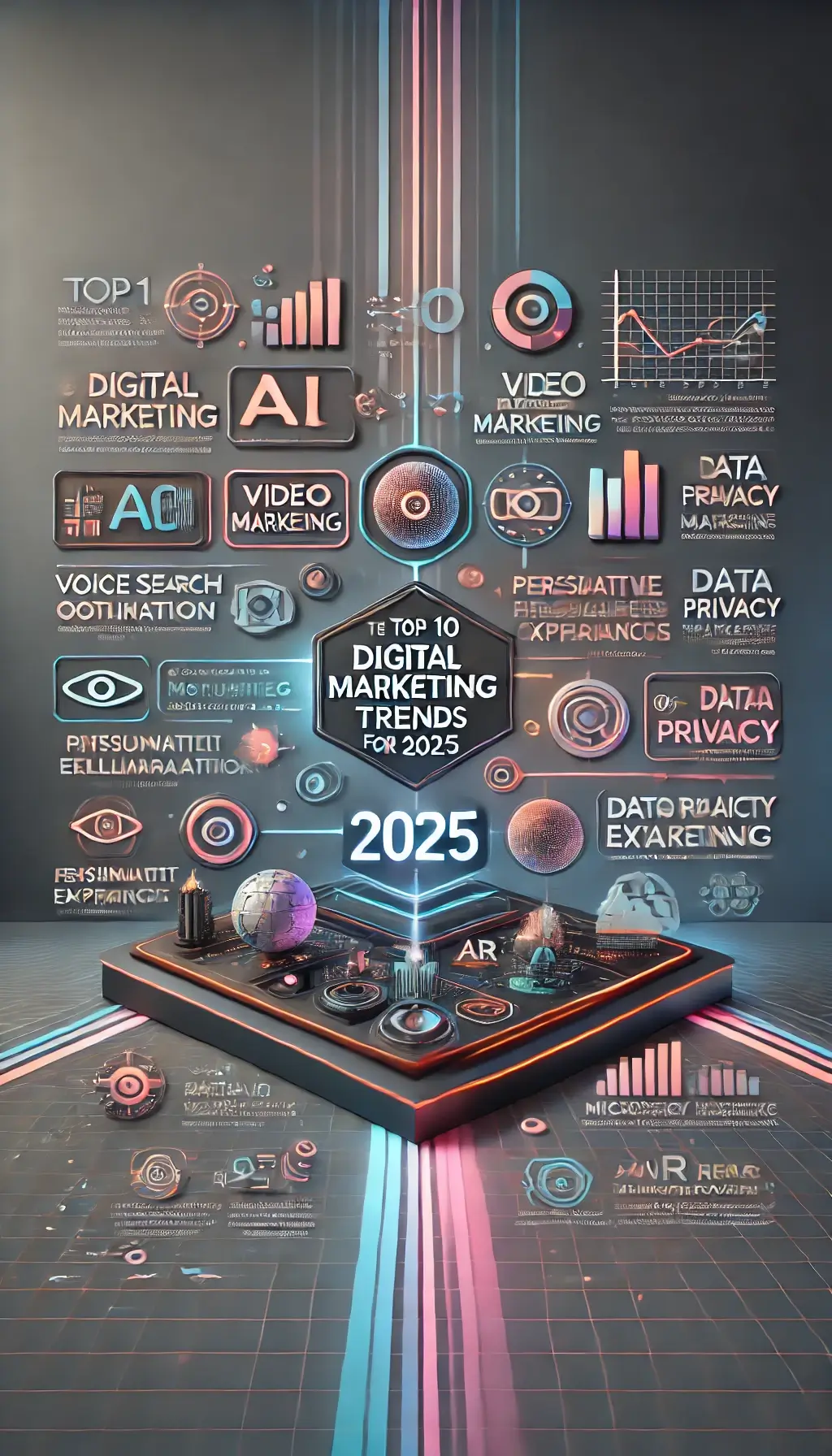The year 2025 is set to bring transformative shifts in how businesses engage audiences online. With technology evolving rapidly, understanding digital marketing trends is crucial for staying ahead. By leveraging these emerging strategies, businesses can tap into innovative approaches to connect with customers and boost results. Below, we explore ten game-changing trends that will redefine the future of digital marketing.
Trends Shaping the Future of Digital Marketing Success
1. AI-Driven Marketing Techniques: The Rise of Automation
Artificial intelligence continues to revolutionize marketing with tools that analyze consumer behavior and deliver personalized recommendations. AI-driven automation allows businesses to create content, optimize ads, and enhance customer interactions without extensive manual effort. This trend will dominate digital marketing strategies in 2025.
2. Personalized Marketing for Better ROI
Generic campaigns are becoming a thing of the past. Personalized marketing, powered by AI and data analytics, is driving higher engagement. Businesses that tailor experiences based on customer preferences can improve ROI significantly. For instance, personalized email campaigns are known to generate higher open rates.
3. Low-Cost Digital Marketing Ideas for Small Businesses
Budget-friendly approaches like leveraging social media and SEO remain essential for startups and small businesses. In 2025, using tools like chatbots, influencer marketing, and user-generated content will offer affordable solutions to compete with larger brands.
4. Voice Search Optimization: A Growing Necessity
With the rise of smart speakers and voice-activated assistants, optimizing for voice search is no longer optional. Businesses must craft conversational content that answers specific questions directly. This trend aligns with the increasing need for convenience in consumer interactions.
5. The Future of Video Marketing
Video remains one of the most effective ways to engage audiences. Interactive and shoppable videos will dominate in 2025. From short-form clips on TikTok to live shopping events, video content will continue to drive conversions and build brand loyalty.

6. Emerging Digital Marketing Strategies for 2025
Businesses must adopt emerging strategies like augmented reality (AR) ads, virtual events, and immersive brand experiences. These innovative approaches help brands stand out and create memorable customer interactions.
7. Sustainability Marketing: Connecting Through Shared Values
Consumers increasingly prefer brands that align with their values. Promoting eco-friendly practices and showcasing corporate social responsibility builds trust. Sustainability marketing will be a key trend in connecting with ethically conscious audiences.
8. The Power of Influencer Collaboration
Influencers remain pivotal in modern marketing. Partnering with niche creators allows brands to reach highly targeted audiences. Micro-influencers, in particular, offer authentic engagement at a fraction of the cost of celebrity endorsements.
9. Optimizing for Emerging Markets
Expanding into underserved regions is now easier with advanced digital tools. Businesses leveraging low-cost marketing ideas can tap into new markets, offering localized campaigns and gaining a competitive edge.
10. Augmented and Virtual Reality for Enhanced Engagement
AR and VR technologies provide immersive experiences that captivate audiences. From virtual try-ons to 3D product displays, these technologies will redefine customer interaction and elevate brand experiences.
Digital Marketing Trends to Target Gen Z Consumers
Gen Z, born between 1997 and 2012, is a unique generation that grew up in a digital-first world. With their affinity for technology and a preference for authentic, personalized experiences, Gen Z has reshaped how businesses approach marketing. Understanding how to use Digital Marketing Trends effectively is crucial to connecting with this dynamic audience.
Gen Z is projected to become one of the most influential consumer groups, with significant buying power. Unlike previous generations, they prioritize values like sustainability, inclusivity, and transparency when choosing brands. To reach them, businesses must adapt their strategies by leveraging the latest Digital Marketing Trends .
Preparing for the Next Wave of Digital Marketing Trends
1. Embrace Social Media Dominance
Social media is where Gen Z spends a majority of their time online. Platforms like TikTok, Instagram, and Snapchat dominate their attention. To effectively reach this audience:
- Create short-form video content: Engage them with authentic, creative videos.
- Leverage user-generated content (UGC): Encourage Gen Z consumers to create and share their experiences with your brand.
- Use influencers wisely: Collaborate with micro and nano influencers who align with their values for maximum authenticity.
2. Personalization is Key
Gen Z expects highly personalized experiences. By utilizing AI-driven digital marketing trends, you can:
- Tailor ads and content to their preferences.
- Use data to send personalized emails or messages.
- Provide interactive shopping experiences like quizzes or AR filters.
3. Prioritize Mobile-First Strategies
Gen Z is glued to their smartphones, so ensuring your marketing efforts are mobile-friendly is essential. Key tactics include:
- Optimize websites for mobile: Ensure quick load times and responsive designs.
- Invest in mobile ads: Use platforms like Instagram Stories or TikTok ads to grab their attention.
- Enable one-click purchases: Make the shopping process seamless with fast, mobile-first checkout options.
4. Highlight Your Brand’s Values
Gen Z connects with brands that share their values. Use digital marketing to:
- Promote sustainability and ethical practices.
- Showcase inclusivity in your campaigns.
- Use storytelling to explain how your brand makes a positive impact.
5. Gamify the Experience
Gamification taps into Gen Z’s love for interactive and fun experiences. Incorporate gaming-inspired elements such as:
- Loyalty programs with rewards for actions.
- Interactive challenges or contests.
- AR-based games that promote engagement.
6. Leverage Video Marketing
Video content is a top Digital Marketing Trends for engaging Gen Z. Focus on:
- Creating entertaining TikToks and Instagram Reels.
- Producing behind-the-scenes videos to show authenticity.
- Using platforms like YouTube for longer, value-driven content.
7. Experiment with New Technologies
Gen Z loves innovation, so staying ahead with emerging technologies is essential. Consider:
- Augmented reality (AR): Try AR filters for virtual product testing.
- Chatbots and AI tools: Use these for instant, engaging customer service.
- Voice search optimization: Make your content accessible via smart speakers.
8. Build a Community
Gen Z values belonging and connection. Use digital marketing to foster a community by:
- Creating private groups on social platforms like Discord.
- Engaging with followers through direct messages and comments.
- Hosting live sessions to answer questions and share insights.
By staying on top of digital marketing trends and tailoring your approach to Gen Z’s preferences, your business can build lasting connections with this influential audience. Remember to stay authentic, innovative, and aligned with their values to ensure success in this fast-evolving market.
Building Brand Loyalty Through Emotional Marketing Strategies
Brand loyalty goes beyond offering great products or services; it’s about forming deep emotional connections with your audience. Emotional marketing strategies tap into human feelings, fostering trust and creating lasting relationships. By understanding how emotions drive decisions, businesses can use this approach to build brand loyalty that stands the test of time.
Emotional marketing focuses on evoking feelings like happiness, nostalgia, trust, or even excitement to connect with customers on a deeper level. Instead of just promoting features, it highlights the emotional benefits of a product or brand. This approach makes your brand memorable and encourages repeat business.
Why Emotions Matter in Building Loyalty
- Emotions drive decisions: Research shows that emotions, not logic, often guide purchasing choices.
- Stronger connections: When customers feel emotionally connected to a brand, they are more likely to stay loyal.
- Brand differentiation: Emotional marketing helps your business stand out in a crowded marketplace.
Emotional Marketing Strategies to Build Brand Loyalty
1. Tell a Compelling Story
Stories create emotional resonance and make your brand relatable.
- Share how your company started and the challenges you overcame.
- Highlight customer success stories to show the real impact of your brand.
- Use storytelling in your ads, social media posts, and content marketing.
2. Appeal to Core Values
People are loyal to brands that align with their personal beliefs.
- Showcase your commitment to causes like sustainability or inclusivity.
- Be transparent about your values and how they influence your business practices.
- Involve customers in campaigns that promote shared values.
3. Create Positive Emotional Experiences
Focus on making every interaction with your brand delightful.
- Surprise customers with unexpected perks or gifts.
- Deliver exceptional customer service to make them feel valued.
- Use humor or uplifting content in your marketing to leave a positive impression.
4. Use Visual Storytelling
Visuals often evoke emotions faster than words.
- Share videos, images, or graphics that inspire and connect emotionally.
- Use colors and designs that align with the feelings you want to evoke.
- Incorporate user-generated content to showcase real-life experiences with your brand.
5. Leverage Nostalgia
Nostalgia creates a sense of comfort and familiarity.
- Reference past trends, events, or cultural moments in your campaigns.
- Use retro branding or packaging to tap into fond memories.
- Highlight milestones or anniversaries to celebrate your brand’s journey with customers.
6. Build a Community
People are loyal to brands that make them feel part of something bigger.
- Create exclusive groups or forums where customers can connect.
- Host events, webinars, or live sessions to engage with your audience.
- Encourage discussions about shared passions and interests.
7. Personalize Interactions
Make customers feel like they matter.
- Use data to tailor recommendations and communications.
- Send personalized thank-you notes or messages.
- Celebrate important moments like birthdays or anniversaries with special offers.
Measuring the Impact of Emotional Marketing
To ensure your emotional marketing efforts are building loyalty, track:
- Customer retention rates: Are your customers coming back?
- Engagement metrics: Are your campaigns generating emotional responses, such as likes, shares, or comments?
- Feedback and reviews: Are customers expressing positive feelings about your brand?
Building brand loyalty through emotional marketing strategies involves creating meaningful connections that go beyond transactions. By appealing to your audience’s emotions, you foster trust, engagement, and long-term loyalty. Whether through storytelling, personalization, or creating shared values, emotional marketing helps transform customers into lifelong advocates for your brand.
Conclusion
Adapting to these digital marketing trends in 2025 will be essential for businesses aiming to thrive in a competitive landscape. By embracing personalized strategies, AI-driven tools, and sustainable practices, brands can foster deeper connections and achieve long-term success. Start preparing today to make the most of these opportunities and secure your place in the future of marketing.
Discover more from Grow and Succeed Blog
Subscribe to get the latest posts sent to your email.






